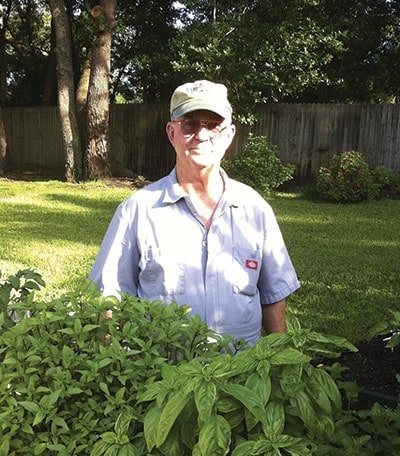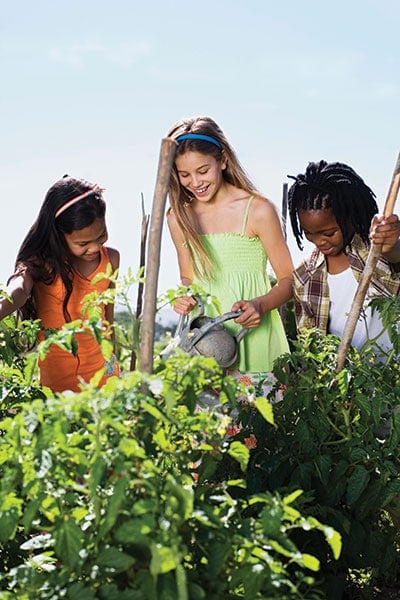Various ministries abound within the Adventist Church—and each has a vital role to play. Mine, however, is a little different from the norm. I call it Gardening for God.
Ellen White said that the health message is the “entering wedge”1 for leading individuals to Jesus, because this, rather than doctrinal issues, is one that most people are more interested in discussing. Countless people today struggle with health challenges, and they are looking for answers that will bring relief to themselves or their family members and friends.
I have found that gardening is an “entering wedge.” Ellen White addressed gardening specifically in her writings. Here is one of my favorite quotes:
“In the cultivation of the soil the thoughtful worker will find that treasures little dreamed of are opening up before him. No one can succeed in agriculture or gardening without attention to the laws involved. The special needs of every variety of plant must be studied. Different varieties require different soil and cultivation, and compliance with the laws governing each is the condition of success.”2
I remember gardening as a child with my grandmother in southeast Texas. We would till the soil and mix in manure that we would get from the local chicken farmers and cattle ranchers. How could I forget filling the bed of our 1952 Chevy pickup with manure? Then we planted tomatoes, beans, okra, eggplant, squash, and radishes. What a treat to harvest and enjoy veggies fresh from the garden! MASTER GARDENER: Lloyd Babb shows off vegetable plants growing in his home garden." class="img-right" style="float: right;">
MASTER GARDENER: Lloyd Babb shows off vegetable plants growing in his home garden." class="img-right" style="float: right;">
For many reasons interest in gardening is increasing today; more and more people are looking for ways to grow their own vegetables. I recently hosted a fall gardening class that featured a fellow master gardener who is also a local TV and radio gardening celebrity and columnist. More than 150 people attended. Along with instruction on gardening, we sold farm-fresh organic eggs and raw honey, and gave out door prizes. During the previous year I hosted and/or taught 12 classes on various aspects of gardening, such as basic gardening, hydroponics, herbs and their uses, lawn maintenance, butterfly gardening, square-foot gardening, seed usage versus transplants, and soil nutrition.
Reasons to Garden
So why garden? Here are nine reasons:
- Vegetables Have Flowers Too: Some striking and beautiful flowers can be found blooming in the midst of the vegetable patch. Have you ever see an exotic-looking okra flower? What about a gigantic globe artichoke left to form a flower head? Even hummingbirds can’t resist the bright blossoms of climbing runner beans. And guess where those hybridized sunflowers got their start—in a vegetable garden!
- Vegetable Gardening Promotes Health: Planting any type of garden provides health benefits of exercise and fresh air, but growing your own fresh organic vegetables will also supply you with nutritious produce loaded with vitamins and nutrients.
- Edible Gardens Are Picture-perfect: If you believe that a vegetable garden has to be an eyesore, think again. Blueberry bushes, rainbow chards, palm kales, and nasturtiums are samples of the many edible plants that love posing for the camera. A veggie garden can be designed to offer just as much beauty, color, variety, and interest to your landscape as any ornamental-only garden.
- Vegetables Are Historical: Heirloom vegetables have been treasured and passed down for centuries, and some come with fascinating histories. Fruit trees grown by presidents, seeds so precious that they were smuggled from different countries, a tomato plant famous for paying off a mortgage—there are many interesting stories to be gleaned from the heirloom vegetable garden.
- Growing Veggies Will Make You Wealthy: A vegetable garden may help to slash those costly grocery bills. Besides, if the prices of organic produce continue to rise and food safety issues persist, perhaps one day you’ll be able to turn that backyard vegetable factory into a real moneymaker.
- Vegetable Gardens Are Versatile: Whether you call it a Kitchen Garden, an Ornamental Edible Garden, or a French Intensive Garden, a simple vegetable patch can incorporate all manner of vegetation from fruits and vegetables to herbs, flowers, and even a few edible weeds,3 all growing together on common ground.
- Vegetable Gardeners Have More Friends: Don’t believe it? Just let word slip that you have an abundance of vine-ripened gourmet tomatoes, juicy homegrown melons, fresh ears of sweet corn, or other delicious gourmet treats growing right in your backyard, and your popularity is guaranteed to rise. I know this to be a fact since I have many neighbors who are willing to pay for my tomatoes.
- Growing Vegetables Fosters Creativity: You’ll be amazed at your ability to come up with new ideas for preparing loads of fresh produce. After all, how do you think that inventions such as zucchini bread were created, or that rhubarb and strawberries happened to find their way together into a wide assortment of desserts?
- Cultivating Independence: Your vegetable garden won’t necessarily make you self-sufficient, but it’s nice to know that your own two hands can put food on the table, reduce your dependency on produce from supermarkets, and provide gourmet-quality fruits and vegetables for your family’s enjoyment.
Gardening Is for Children, Too
One of my favorite childhood memories was running around the garden chasing lightning bugs and catching tadpoles in nearby ponds. Sadly, too many kids spend most of their summer indoors playing video games and watching TV. This lack of contact with nature can negatively affect children’s health, well-being, and academic performance, many experts say. Ellen White also wrote about the importance of children spending time outdoors:
“While the children and youth gain knowledge of facts from teachers and textbooks, let them learn to draw lessons and discern truth for themselves. In their gardening, question them as to what they learn from the care of their plants. As they look on a beautiful landscape, ask them why God clothed the fields and woods with such lovely and varied hues. Why was not all colored a somber brown? When they gather the flowers, lead them to think why He spared us the beauty of these wanderers from Eden. Teach them to notice the evidences everywhere manifest in nature of God’s thought for us, the wonderful adaptation of all things to our need and happiness.”4
There are so many reasons kids should garden. Here are just a few:
- Prevents Nature Deficit Disorder: With so many kids spending time away from nature, we’re seeing evidence of what is called “nature deficit disorder,” which can negatively impact both physical and emotional health. So unplug the electronic gadgets regularly and involve your family more often in the garden.
- Teaches About Nature . . . and More: Maybe it’s growing a sunflower from a seed or building a bean tepee in the backyard, but when you involve kids in gardening, they learn hands-on skills that broaden their awareness about the world around them. They learn why butterflies and bees help pollinate plants, and why the right amounts of water and sun are needed for gardens to grow. Along with a greater appreciation for nature, gardens also teach children about biology, math, history, nutrition, and more.
- Provides Exercise: Gardening provides lots of healthy ways for kids to stay active. With digging, raking, and planting, your children will get plenty of exercise, vitamin D, and fresh air. Be sure to make
your garden chores creative, and mix them up a bit so they stay interesting. With a little patience you’ll find your children becoming helpful, fun garden assistants. - Encourages Kids to Eat Produce: Parents with a vegetable garden tell you that children who grow up around homegrown vegetables are much more likely to eat what’s grown. Maybe it’s because they enjoy picking fresh beans or tomatoes. Or perhaps it’s because fresh fruit and vegetables simply taste better just picked from the yard. But whatever the reason, gardening is an excellent way to help solve the problem of children not eating their veggies.
- Prepares Them for Life: There’s something amazing about gardening. Tiny seeds that grow into healthy, big plants; birds that swoop down to capture a juicy worm; the end of the growing season when the plants start to die back for winter—all these lessons can be wonderful reminders of the need to be patient while things grow, and to keep the faith when some things die away. Besides, our brains are wired to be out in nature. Perhaps that’s why it feels so natural.
So why do I garden? We started out in a garden—the Garden of Eden—and we will end up in a garden in the earth made new. I’m getting ready for that new garden. What about you?
- Ellen G. White, Counsels on Diet and Foods (Washington, D.C.: Review and Herald Pub. Assn., 1938), p. 73.
- Ellen G. White, Education (Mountain View, Calif.: Pacific Press Pub. Assn., 1903), pp. 111, 112.
- www.veggiegardeningtips.com/discovering-edible-weeds/.
- Ellen G. White, Child Guidance (Nashville: Southern Pub. Assn., 1954), p. 35.

 MASTER GARDENER: Lloyd Babb shows off vegetable plants growing in his home garden." class="img-right" style="float: right;">
MASTER GARDENER: Lloyd Babb shows off vegetable plants growing in his home garden." class="img-right" style="float: right;">